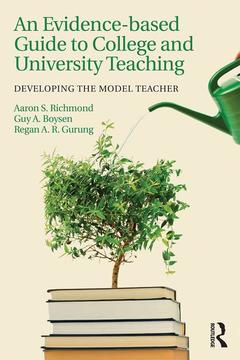An Evidence-based Guide to College and University Teaching Developing the Model Teacher
Auteurs : Richmond Aaron S., Boysen Guy A., Gurung Regan A. R.

What makes a good college teacher? This book provides an evidence- based answer to that question by presenting a set of "model teaching characteristics" that define what makes a good college teacher. Based on six fundamental areas of teaching competency? known as Model Teaching Characteristics outlined by The Society for the Teaching of Psychology (STP), this book describes how college faculty from all disciplines and at all levels of experience can use these characteristics to evaluate, guide, and improve their teaching. Evidence based research supports the inclusion of each characteristic, each of? which is illustrated through example, to help readers master the skills. Readers learn to evaluate their teaching abilities by providing guidance on what to document and how to accumulate and organize the evidence. Two introductory chapters outline the model teaching characteristics followed by six chapters, each devoted to one of the characteristics: training, instructional methods, course content, assessment, syllabus construction, and student evaluations.
The book:
-Features in each chapter self-evaluation surveys that help readers identify gaps between the model characteristics and their own teaching, case studies that illustrate common teaching problems, discussion questions that encourage critical thinking, and additional readings for further exploration.
-Discusses the need to master teaching skills such as collaborative learning, listening, and? using technology as well as discipline-specific knowledge.
-Advocates for the use of student-learning outcomes to help teachers better evaluate student performance based on their achievement of specific learning goals.
-Argues for the development of learning objectives that reflect the core of the discipline?s theories and applications, strengthen basic liberal arts skills, and infuse ethical and diversity issues.
-Discusses how to solicit student feedback and utilize these evaluations to improve teaching.
Intended for professional development or teacher training courses offered in masters and doctoral programs in colleges and universities, this book is also an invaluable resource for faculty development centers, college and university administrators, and college teachers of all levels and disciplines, from novice to the most experienced, interested in becoming more effective teachers.
Chapter 1: Why Do We Need Model Teachers? Chapter 2: What is Great Teaching? Chapter 3: How do we Train to be Model Teachers? Chapter 4: What Instructional Methods do Model Teachers Use? Chapter 5: What do Students Learn in Model Teachers’ Courses? Chapter 6: How do Model Teachers Assess Student Learning? Chapter 7: How do Model Teachers Construct Syllabi? Chapter 8: How do Model Teachers Use Student Evaluations?
Aaron S. Richmond is a Professor of Educational Psychology and Human Development at Metropolitan State University of Denver.
Guy A. Boysen is an Associate Professor of Psychology at McKendree University.
Regan A. R. Gurung is Ben J. and Joyce Rosenberg Professor of Human Development and Psychology at the University of Wisconsin, Green Bay.
Date de parution : 07-2016
15.2x22.9 cm
Disponible chez l'éditeur (délai d'approvisionnement : 14 jours).
Prix indicatif 55,07 €
Ajouter au panierDate de parution : 07-2016
15.2x22.9 cm
Disponible chez l'éditeur (délai d'approvisionnement : 14 jours).
Prix indicatif 189,31 €
Ajouter au panierThèmes d’An Evidence-based Guide to College and University Teaching :
Mots-clés :
active learning, assessment, best practices, College Teaching, college teachers, diversity, ethical teaching, ethics, evaluation, evidence based, faculty, instruction, instructors, learning outcomes, liberal arts, outcomes assessment, pedagogy, professional developement, professors, scholarship of teaching and learning, skill developement, student evaluations of teaching, syllabus, Teachers, teacher training, (N=27)



